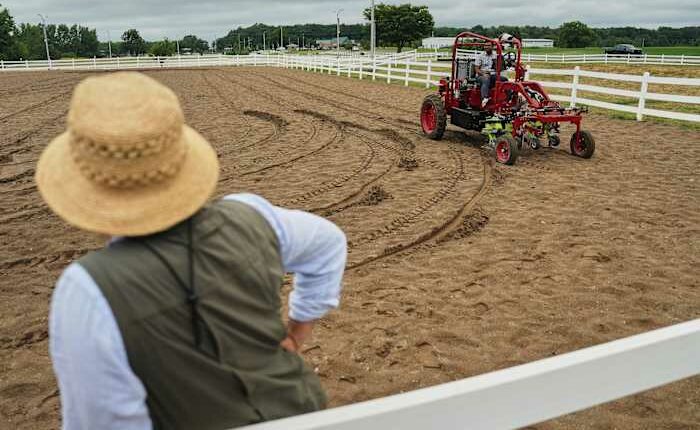Share this @internewscast.com

EAST LANSING, Mich. – Last month, inside an indoor horseback riding arena, a group of farmers prepared to try out a new tool: an electric tractor.
As each farmer took their turn, they noticed the tractor’s rapid acceleration and shared their insights with researchers from Michigan State University, who have been developing it for more than two years.
The farmers commented on the motor’s low noise level. Many found the concept intriguing, though some had reservations about the battery’s placement potentially lowering field clearance, and others worried about the cost.
“Our aim for retirement is to transition to all-electric equipment on the farm, and the tractor is the last on our list,” said Don Dunklee, who provided feedback. He operates a small organic vegetable farm powered by wind and solar for many years.
While the market is still emerging, some researchers and entrepreneurs believe electric tractors could be perfect for small farmers focused on sustainability, making their products more appealing. The compact, cherry-red machine is ideal for tasks such as weeding specialty crop fields or maneuvering between orchard trees. Farmers with solar power can bypass diesel expenses.
Agriculture significantly contributes to global climate-warming emissions, and tractors, though not the worst offenders, are seen as a way to attract environmentally-conscious buyers.
“There’s reduced emissions, but before you get there, you have to be solving for other problems,” including noise, ease of use and cost, said Derek Muller, business manager for battery electric systems at John Deere.
There are downsides — electric tractors are aimed at filling a niche, not overturning the status quo. And while battery technology has come a long way, they can’t last all day or match the massive horsepower of a diesel engine that sets giant tractors cruising through the sprawling grain and soybean operations of the Midwest.
Why few companies offer electric tractor options, and who wants them
In addition to battery limitations, there are other structural obstacles. Most farmers do not have fast electric chargers, nor do they have solar panels to supply those chargers with free electricity — diesel would need to be much more expensive for the economics to turn sharply in favor of electric. But companies are starting to see an opportunity.
“For John Deere, it is not the only solution,” Muller said. “It’s not going to be where we lead our efforts. It’s going to be one of many options.”
The company has built a small utility electric tractor prototype. It joins a limited set of offerings from other companies like Monarch Tractor, which started in 2019 with the aim to help farmers, who have traditionally struggled with razor-thin profits, save money, work sustainably and more efficiently.
Ajit Srivastava, an agricultural engineer and Michigan State professor who hosted the farmer feedback session, wants to help smallholder farmers across the world. Such farmers grow about a third of the world’s food but many do it with only hand tools. He started trying to emulate a pair of oxen made of off-the-shelf parts, so anyone could build it themselves.
“If we were to mechanize all the smallholder farmers in the world, there isn’t enough diesel out there to power them. So we have to find some other source,” Srivastava said.
It’s still a work in progress. Rain had postponed the feedback session, originally planned for the spring, because the tractor hadn’t been waterproofed yet. It also doesn’t have enough power for some jobs like tilling. But farmers generally like what Srivastava had developed. He hopes it could eventually be sold for roughly $30,000, substantially cheaper than some of the competition.
“The steering is really responsive. It just seems to run really smooth,” said Dunklee, adding, however, that it might not do everything he needs on a farm yet. “Probably the biggest thing would be it’s relatively quiet.”
Muller said they’re seeing demand for electric tractors from Europe, where farming policies are sometimes more progressive. And there’s also a market at universities in other countries where researchers are studying agriculture, said Brendan Dowdle, chief business officer of Bonsai Robotics, which sells modular, automated electric farm robots that can work together to mimic some tasks ordinarily done by a tractor.
One possible customer is the so-called “gentleman farmer” who has a small operation of specialty crops or vegetables and farms for fun, not necessarily to make a living.
“They want to be self-sustaining,” said Patrick Woolcock, an associate engineering professor and agriculture expert at the University of Wisconsin-River Falls.
Plus, without harmful diesel emissions, they can work in greenhouses and, with fewer parts, there’s hope repairs won’t be as complicated, at least once a readily available supply is established.
Could electric tractors be more compatible with automation?
Some entrepreneurs see electric tractors as a step on the path to automation — fewer workers, more efficiency and less cost. Engineers are now designing machines that will drive themselves and power precise weeders and planters.
For example, Monarch Tractor CEO Praveen Penmetsa noted that if a self-guided tractor gets stuck and has to notify the farmer, electric power has clear benefits. A diesel tractor would sit there idling, but an electric one doesn’t waste fuel while waiting.
Srivastava also said he’s just trying to make people’s lives easier — looking backward all day to make sure a plow is operating properly is grueling. So, a self-driving tractor would let farmers pay more attention to ensuring harvesting is happening properly, or the weeder isn’t accidentally digging up crops.
“Not that we want to take the operator off the tractor, the operator would be there, but they can focus on how well the operation is going rather than making sure the tractor is in the rows,” he said.
Still, some aren’t so sure electric has such a big advantage when it comes to automation. Tim Bucher, CEO of Agtonomy, a company focused on bringing autonomy software to farm vehicles, was all-in on electric a few years ago. But the technology has gotten so good that now his customers can pick and choose the energy source for their tractor and see similar results, he said. And with government electric vehicle subsidies disappearing, there’s less incentive for most farmers to go that route.
On his own farm, though, he opts for electric, and he says he’s seen economic returns.
And from an environmental perspective, “it also just makes me feel better,” he said.
___
Phillis reported from Washington and Walling reported from Chicago.
___
The Associated Press’ climate and environmental coverage receives financial support from multiple private foundations. AP is solely responsible for all content. Find AP’s standards for working with philanthropies, a list of supporters and funded coverage areas at AP.org.
Copyright 2025 The Associated Press. All rights reserved. This material may not be published, broadcast, rewritten or redistributed without permission.











